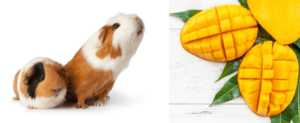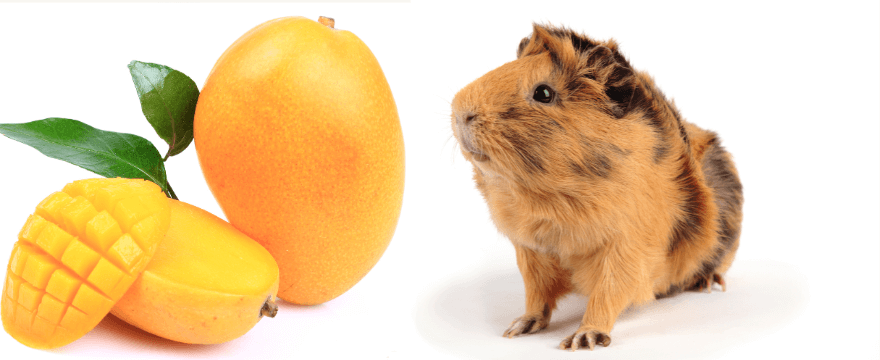Have you ever thought about whether your cute little fluffy friend could enjoy the sweet, tropical goodness of a mango? I definitely did! Watching my guinea pig, Pipsqueak, happily munching on a juicy slice was irresistibly adorable. Before treating your furry friend to a mango feast, let’s explore whether guinea pigs can eat mango.
The Benefits of Mango for Guinea Pigs (if any):
Nutritional Composition of Mango: Mangoes are well-known for their deliciously sweet and juicy taste while also being packed with nutrients. Mangoes are packed with vitamins, minerals, and antioxidants, providing a range of nutrients that may be beneficial for guinea pigs.
The following are some essential mango ingredients:
:max_bytes(150000):strip_icc()/mango_annotated-42b38e4d9d5345aeb904ab56ab87dbab.jpg)
Vitamin C:
Guinea pigs, similar to humans, cannot produce vitamin C and need to get it from their diet to avoid scurvy, which can be life-threatening. Mangoes are a great way to enhance your furry friend’s health by boosting their immune system and promoting overall well-being.
Vitamin A:
Mangoes are rich in beta-carotene, which is a precursor to vitamin A. Ensuring proper vision, growth, and immune system function is crucial for guinea pigs.
Fiber:
Ensuring adequate fiber intake is essential for maintaining the digestive health of guinea pigs. Although mangoes do not have as much fiber as hay or leafy greens, they can still help with digestion and prevent gastrointestinal problems.
Potassium:
is found in mangoes and is essential for maintaining proper fluid balance, nerve function, and muscle contractions in these animals.
Antioxidants:
Mangoes are packed with antioxidants like beta-carotene and various polyphenols. These compounds aid in neutralizing free radicals, lowering the chances of oxidative stress and inflammation in guinea pigs.
Potential Benefits for Guinea Pigs: Incorporating mangoes into a guinea pig’s diet in moderation can offer several potential benefits:
- Enhanced Immunity: Mangoes are rich in vitamin C, which can help enhance your furry friend’s immune system and lower the chances of infections and illnesses.
- Healthy Vision: The vitamin A from beta-carotene in mangoes helps maintain good vision health for guinea pigs, allowing them to see and move around their surroundings with ease.
- Digestive Health: Mangoes are beneficial for digestion, helping to prevent constipation and other gastrointestinal problems in guinea pigs.
- Electrolyte Balance: Maintaining electrolyte balance is required for the proper functioning of nerves and muscles in guinea pigs, and mangoes can help with this due to their potassium content.
- Antioxidant Protection: Mangoes contain antioxidants that can fight oxidative stress, potentially lowering the risk of age-related diseases and enhancing overall well-being.
Precautions and Moderation: While mangoes can provide various potential advantages for guinea pigs, it’s essential to be cautious and mindful of certain guidelines:
- Mangoes have a high natural sugar content, which may lead to obesity and dental problems if eaten in large amounts. It’s important to control how much and how often you give mango treats to guinea pigs.
- Some guinea pigs may have allergies to mangoes or digestive issues when trying new foods. Keep a close eye on your pet’s response when introducing mango for the first time.
- When offering mangoes to guinea pigs, choose organic options to reduce pesticide exposure.
Concerns About Feeding Mango to Guinea Pigs:
High levels of sugar:
Mangoes are beloved for their naturally sweet taste and succulent flesh. However, this sweetness comes with a cost when it comes to caring for guinea pigs. Feeding mango to guinea pigs can be a concern due to its high sugar content.
Guinea pigs need a small amount of sugar in their diet for energy, but too much sugar can cause health problems like obesity, dental issues, and diabetes. Because mangoes have a higher sugar content than other fruits, excessive consumption can negatively affect your pet’s health.
Digestive Issues:
Guinea pigs have sensitive digestive systems that are designed to handle fibrous vegetation. When introducing new foods, particularly those with high sugar and low fiber content, such as mangoes, it can upset their stomach balance and cause digestive problems.
Mangoes have natural enzymes and fibers that could be hard for guinea pigs to digest, leading to discomfort, bloating, diarrhea, or more severe issues like gastrointestinal stasis, where the digestive system slows down or stops working. So, although giving your guinea pig a little bit of mango might not cause immediate harm, feeding it to them regularly or in large amounts could be risky for their digestive system.
Choking Hazards:
Another critical risk to keep in mind when offering mango to guinea pigs is the potential choking hazard it can pose. Guinea pigs are equipped with small mouths and teeth that are specialized for grinding fibrous vegetation. Big, slippery, or hard chunks of fruit, such as mango, can be a choking hazard if not prepared correctly.
Moreover, mango pits have sturdy fibers and could pose a risk if swallowed unintentionally. Even tiny pieces of fruit can block their air passages or lead to choking if swallowed whole. It’s important to cut the mango into small pieces and remove any pits or seeds before giving it to your guinea pig to prevent choking.
How to Safely Feed Mango to Your Guinea Pig?
Mango, a tasty tropical fruit, can also be an excellent snack for your furry companion, the guinea pig. Just as with any new food added to your pet’s diet, it’s important to be cautious to keep them safe and healthy.
Exploring the proper way to introduce mango into your guinea pig’s diet to ensure they can savor this fruity treat without any negative consequences.
- To prepare mango for your guinea pig, make sure to wash the fruit thoroughly to remove any dirt, pesticides, or residue from the skin. When it comes to guinea pigs, their digestive systems are quite sensitive. Therefore, choosing organic mangoes is a good idea to reduce their exposure to harmful chemicals. Moreover, removing the mango peel can help lower the chances of your furry friend consuming any harmful substances.
- When removing the pit of a mango, it’s important to do so carefully to avoid any choking hazards for your furry friends. Make sure to remove all pits from the fruit before eating.
- Guinea pigs have small mouths and delicate teeth, so it’s crucial to cut the mango into small, bite-sized pieces to avoid choking and make it easier for them to eat. Choose treats that are similar in size to your guinea pig’s regular snacks to make sure they can chew and swallow them easily.
- When adding mango to their diet, do it slowly and in small amounts. Begin by providing a small piece and carefully monitoring their response.
Some guinea pigs may happily enjoy mango, while others may not be interested or may even dislike it. It’s important to keep an eye on their digestive health after they eat, looking out for any signs of discomfort like diarrhea or bloating.
So, can guinea pigs eat mango? The answer, as with most things in life, is not a simple yes or no. Indeed, mangoes can provide your pet with a tasty and nutritious boost of sweetness and vitamins. That being said, moderation is essential. High sugar levels may disrupt their sensitive digestive systems.

Leave a Reply